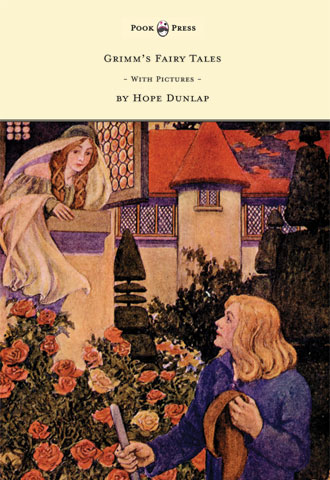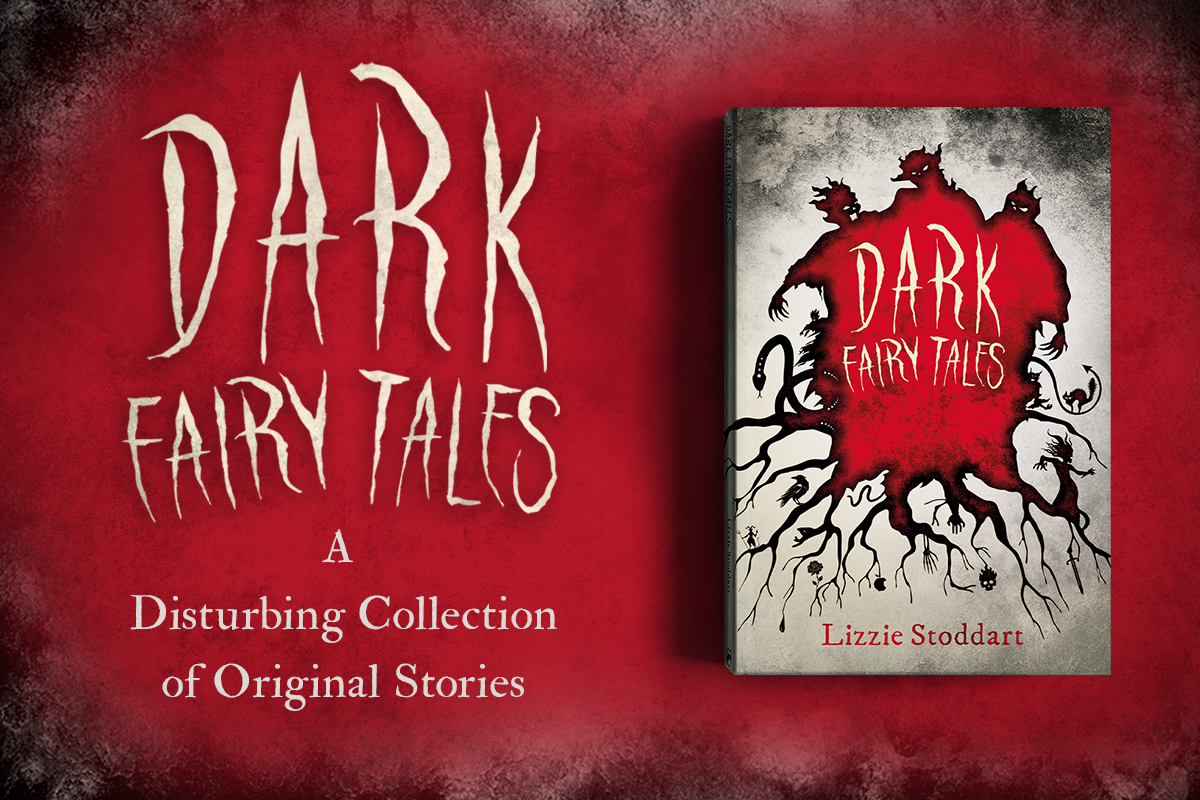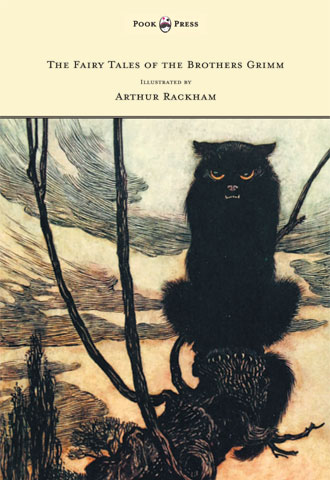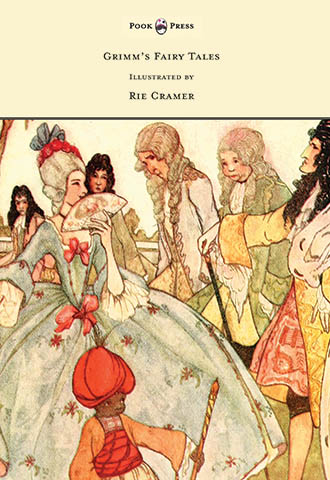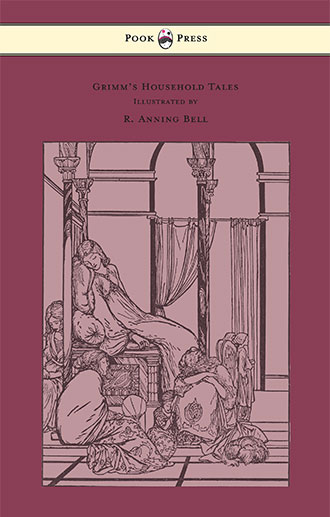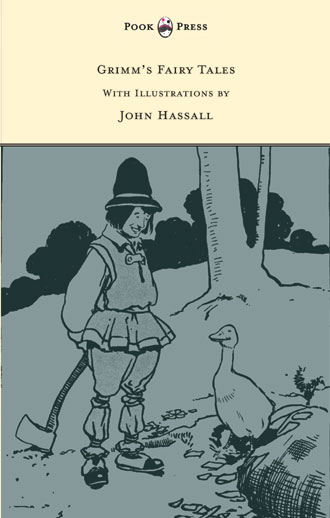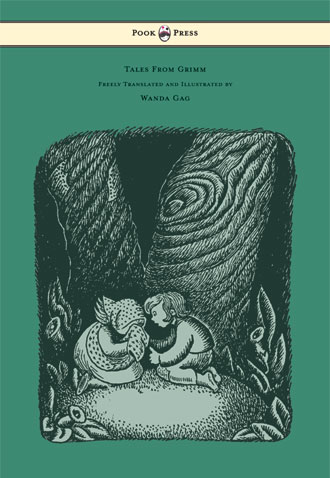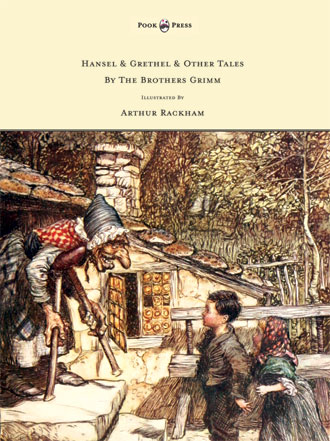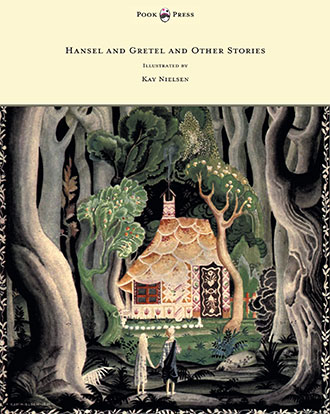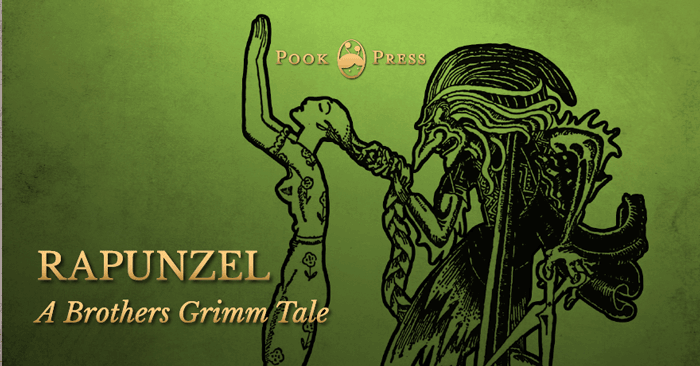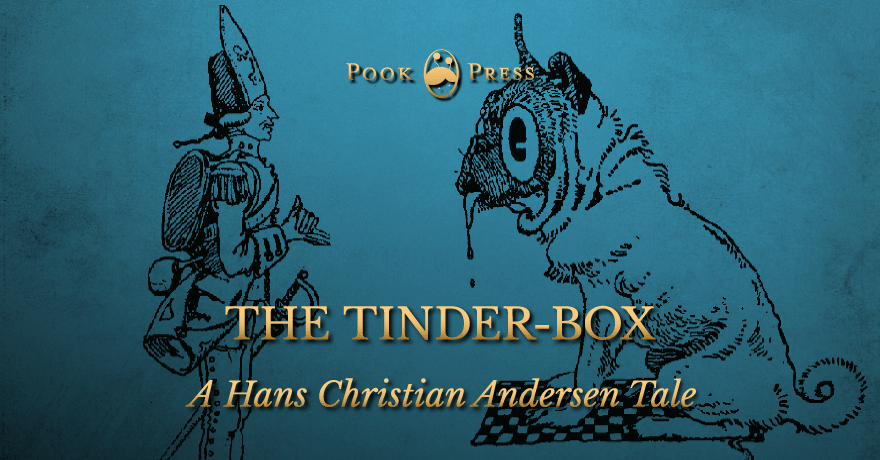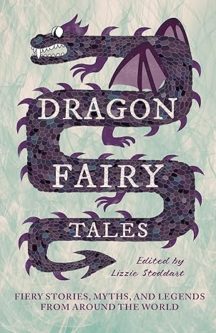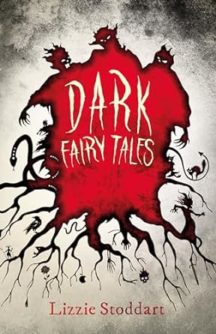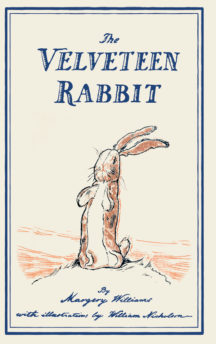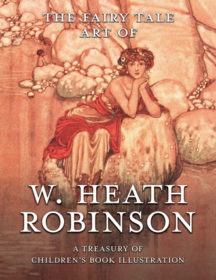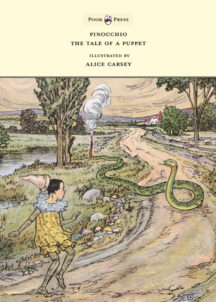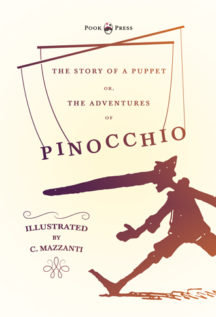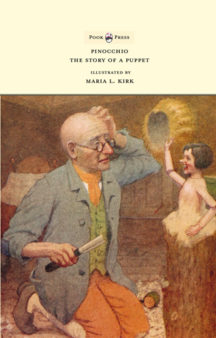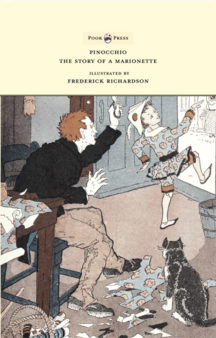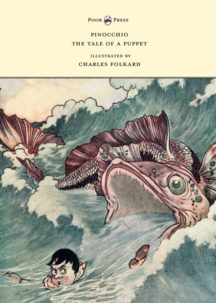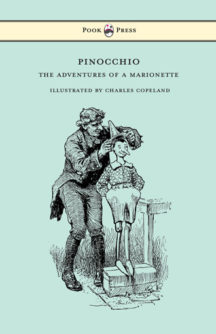The Goose Girl – A Brothers Grimm Tale
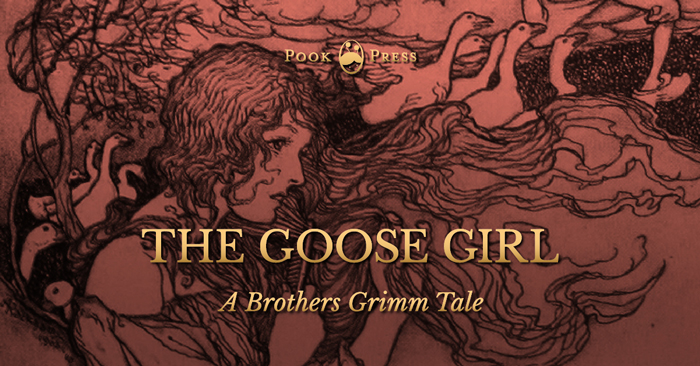
A talking horse, a false bride, and a princess with hair of gold.
The Goose Girl
– A Brothers Grimm Tale –
ONCE upon a time there lived an old Queen, whose husband had been dead some years, and left her with one child, a beautiful daughter. When this daughter grew up she was betrothed to a King’s son, who lived far away; and when the time arrived that she should be married, and as she had to travel into a strange country, the old lady packed up for her use much costly furniture, utensils of gold and silver, cups and jars; in short, all that belonged to a royal bridal treasure, for she loved her child dearly. She sent also a maid to wait upon her and to give her away to the bridegroom, and two horses for the journey; and the horse of the Princess, called Falada, could speak. As soon as the hour of departure arrived, the mother took her daughter into a chamber, and there with a knife she cut her finger with it so that it bled; then she held a napkin beneath, and let three drops of blood fall into it, which she gave to her daughter, saying, “Dear child, preserve this well, and it will help you out of trouble.”
Afterwards the mother and daughter took a sorrowful leave of each other, and the Princess placed the napkin in her bosom, mounted her horse, and rode away to her intended bridegroom. After she had ridden for about an hour she became very thirsty, and said to her servant, “Dismount, and procure me some water from yonder stream in the cup which you carry with you, for I am very thirsty.”
“If you are thirsty,” replied the servant, “dismount yourself, and stoop down to drink the water, for I will not be your maid!”
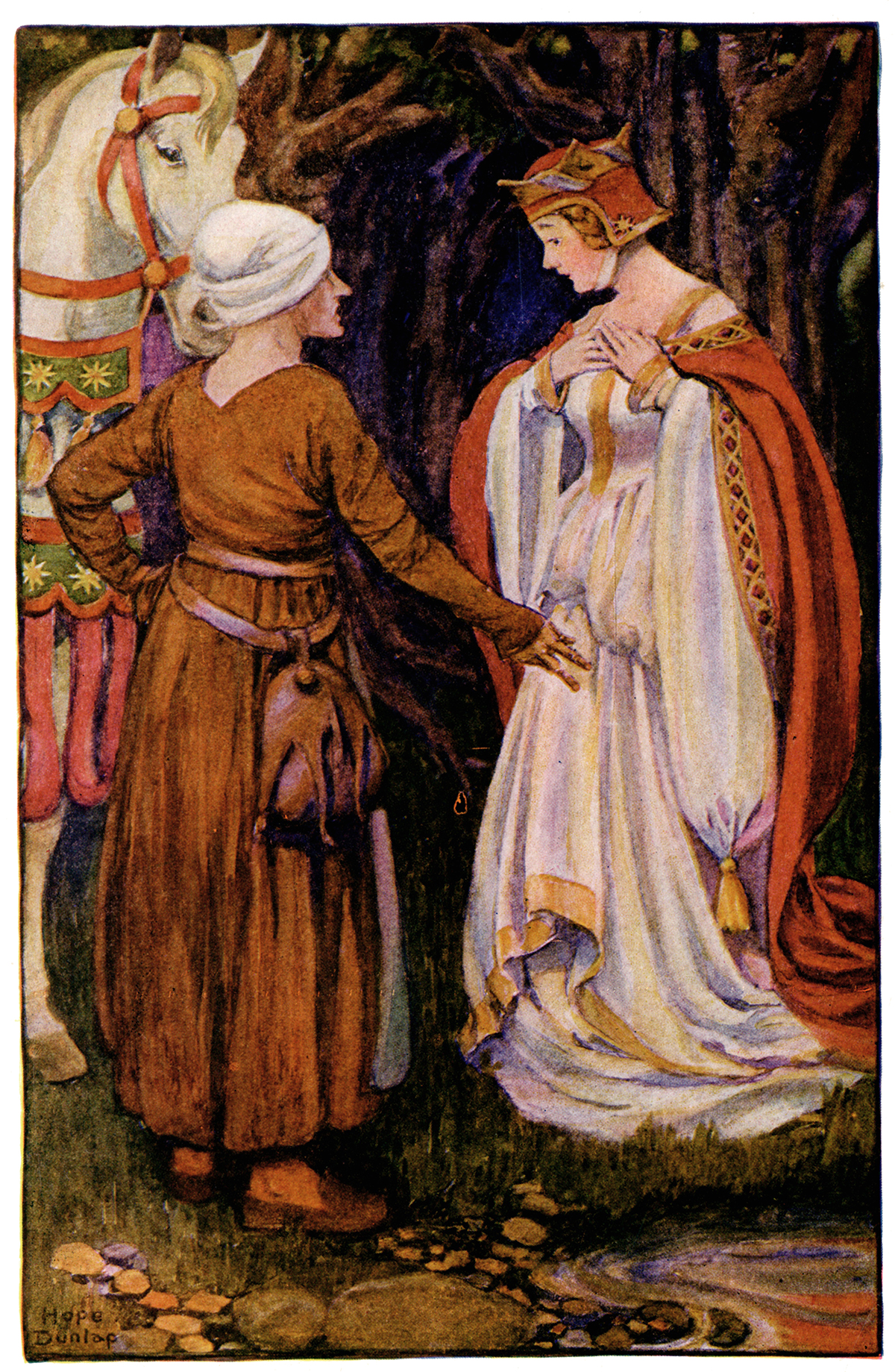
The Goose Girl Illustration by Hope Dunlap
The Princess, on account of her great thirst, did as she was bid, and bending over the brook she drank of its water, without daring to use her golden cup. While she did so the three Drops of Blood said, “Ah! if my mother knew this, her heart would break.” And the Princess felt humbled, but said nothing, and remounted her horse. Then she rode several miles farther, but the day was so hot and the sun so scorching that she felt thirsty again; and as soon as she reached a stream she called her handmaiden again, and bade her take the golden cup and fill it with water, for she had forgotten all the saucy words which before had passed. The maiden, however, replied more haughtily than before, “if you wish to drink, help yourself! I will not be your maid!”
The Princess thereupon got off her horse, and helped herself at the stream, while she wept and cried, “Ah! woe’s me?” and the three Drops of Blood said again, “If your mother knew this, her heart would break.” As she leaned over the water, the napkin wherein were the three drops of blood fell out of her bosom and floated down the stream without her perceiving it, because of her great anguish. But her servant had seen what had happened, and she was glad, for now she had power over her mistress; because, with the loss of the drops of blood, she became weak and powerless. When, then, she would mount again upon her horse Falada, the Maid said, “No, Falada belongs to me; you must get upon this horse”; and she was forced to yield. Then the servant bade her take off her royal clothes, and put on her common ones instead; and, lastly, she made the Princess promise and swear by the open sky that she would say nought of what had passed at the King’s palace; for if she had not so sworn she would have been murdered. But Falada observed all that passed with great attention.
Now was the servant mounted upon Falada, and the rightful Princess upon a sorry hack; and in that way they travelled on till they came to the King’s palace. On their arrival there were great rejoicings, and the young Prince, running towards them, lifted the servant off her horse, supposing that she was the true bride; and she was led up the steps in state, while the real Princess had to stop below. Just then the old King chanced to look out of his window, and saw her standing in the court, and he remarked how delicate and beautiful she was; and, going to the royal apartments, he inquired there of the bride who it was she had brought with her, and left below in the courtyard.
“Only a girl whom I brought with me for company,” said the bride. “Give the wench some work to do, that she may not grow idle.”
The old King, however, had no work for her, and knew of nothing; until at last he said, “Ah! there is a boy who keeps the geese: she can help him.” This youth was called Conrad, and the true bride was set to keep geese with him.
Soon after this, the false bride said to her betrothed, “Dearest, will you grant me a favour?” “Yes,” said he, “with the greatest pleasure.” “Then let the knacker be summoned, that he may cut off the head of the horse on which I rode hither, for it has angered me on the way.” In reality she feared lest the horse might tell how she had used the rightful Princess, and she was glad when it was decided that Falada should die. This came to the ears of the Princess, and she promised secretly to the knacker to give him a piece of gold, if he would show her a kindness, which was that he would nail the head of Falada over a certain large and gloomy arch, through which she had to pass daily with the geese, so that then she might still see, as she had been accustomed, her old steed. The knacker promised, and, after killing the horse, nailed the head in the place which was pointed out, over the door of the arch.
Early in the morning, when she and Conrad drove the geese through the arch, she said in passing,—
Ah, Falada, that you should hang there!
and the Head replied,—
Ah, Princess, that you should pass here!
If thy mother knew thy fate,
Then her heart would surely break!
Then she drove on through the town to a field; and when they arrived on the meadow, she sat down and unloosened her hair, which was of pure gold; and its shining appearance so charmed Conrad, that he endeavoured to pull out a couple of locks. So she sang,—
Blow, blow, thou wind,
Blow Conrad’s hat away;
Its rolling do not stay
Till I have combed my hair,
And tied it up behind.
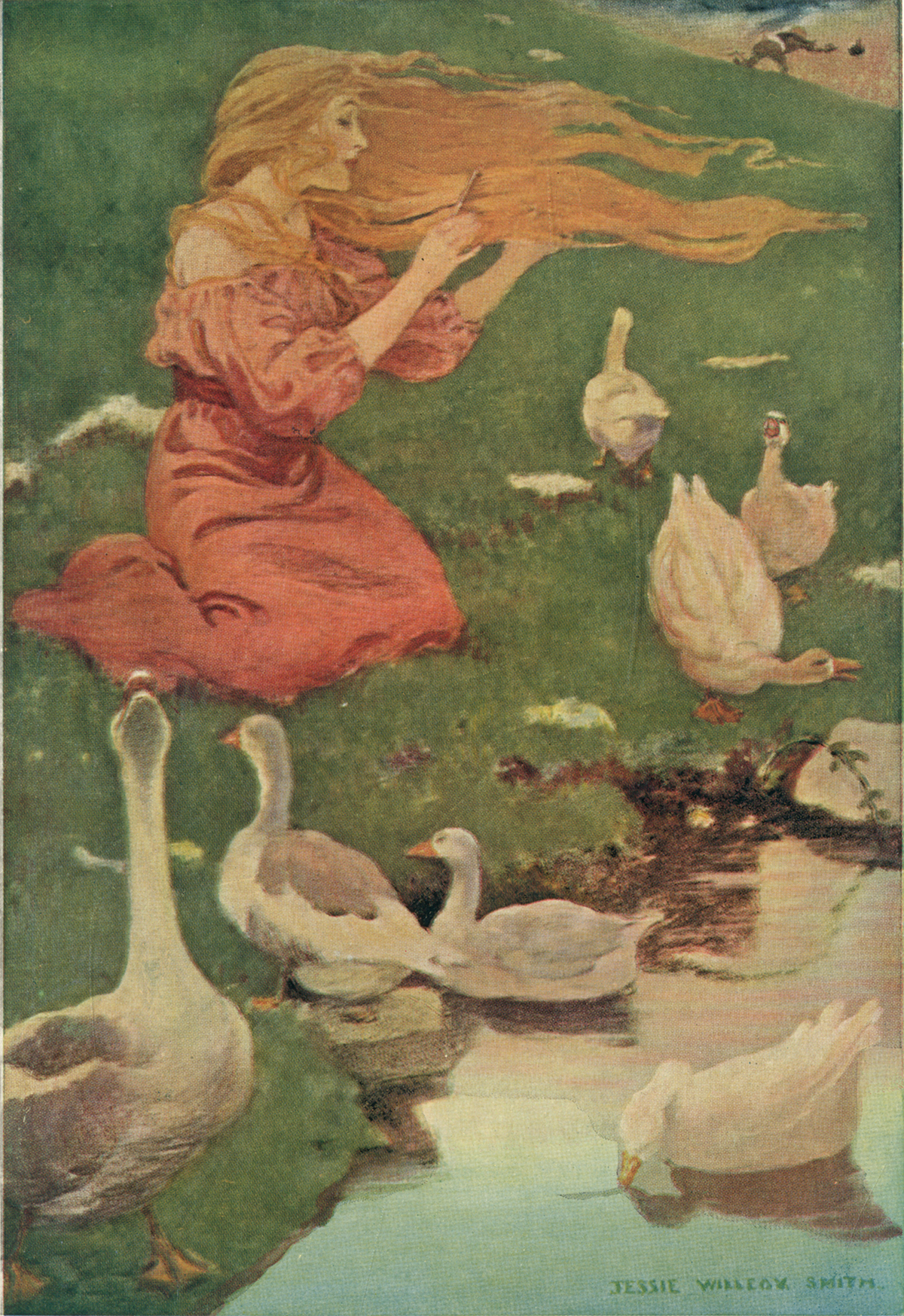
The Goose Girl Illustration by Jessie Willcox Smith
Immediately there came a strong wind, which took Conrad’s hat quite off his head, and led him a rare dance all over the meadows; so that when he returned, what with combing and curling, the Princess had rearranged her hair, so that he could not catch a loose lock. This made Conrad very angry, and he would not speak to her; so that all day long they tended their geese in silence, and at evening they went home.
The following morning they passed again under the gloomy arch, and the true Princess said,—
Ah, Falada, that you should hang there!
and Falada replied,—
Ah, Princess, that you should pass here!
If thy mother knew thy fate,
Then her heart would surely break!
Afterwards, when they got into the meadow, Conrad tried again to snatch one of her golden locks; but she sang immediately,—
Blow, blow, thou wind,
Blow Conrad’s hat away;
Its rolling do not stay
Till I have combed my hair,
And tied it up behind.
So the wind blew, and carried the hat so far away, that by the time Conrad had caught it again, her hair was all combed out, and not a single one loose; so they tended the geese till evening as before.
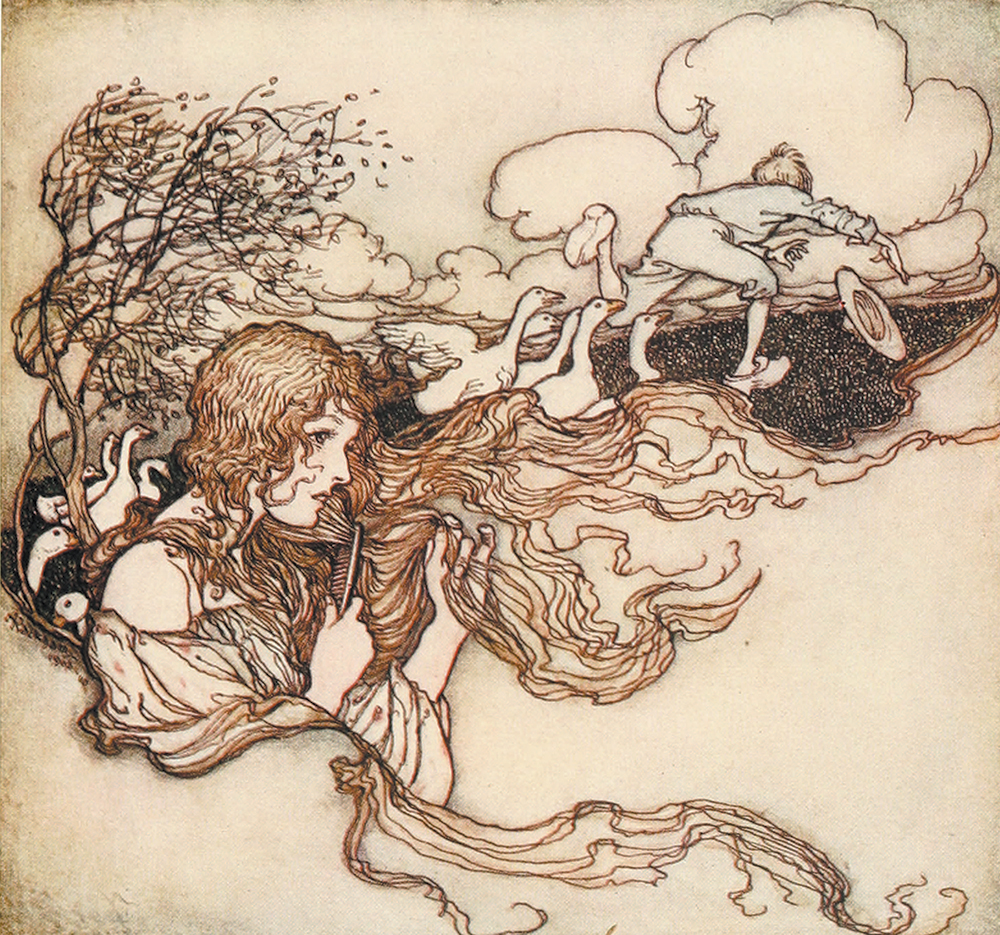
The Goose Girl Illustration by Arthur Rackham
After they returned home, Conrad went to the old King, and declared he would no longer keep geese with the servant.
“Why not?” asked the King.
“Oh! she vexes me the whole day long,” said Conrad; and then the King bade him relate all that had happened. So Conrad did, and told how, in the morning, when they passed through a certain archway, she spoke to a horse’s head, which was nailed up over the door and said,—
Ah, Falada, that you should hang there!
and it replied,—
Ah, Princess, that you should pass here!
If thy mother knew thy fate,
Then her heart would surely break!
and, further, when they arrived in the meadow, how she caused the wind to blow his hat off, so that he had to run after it ever so far. When he had finished his tale, the old King ordered him to drive the geese out again the next morning; and he himself, when morning came, stationed himself behind the gloomy archway, and heard the servant talk to the head of Falada.
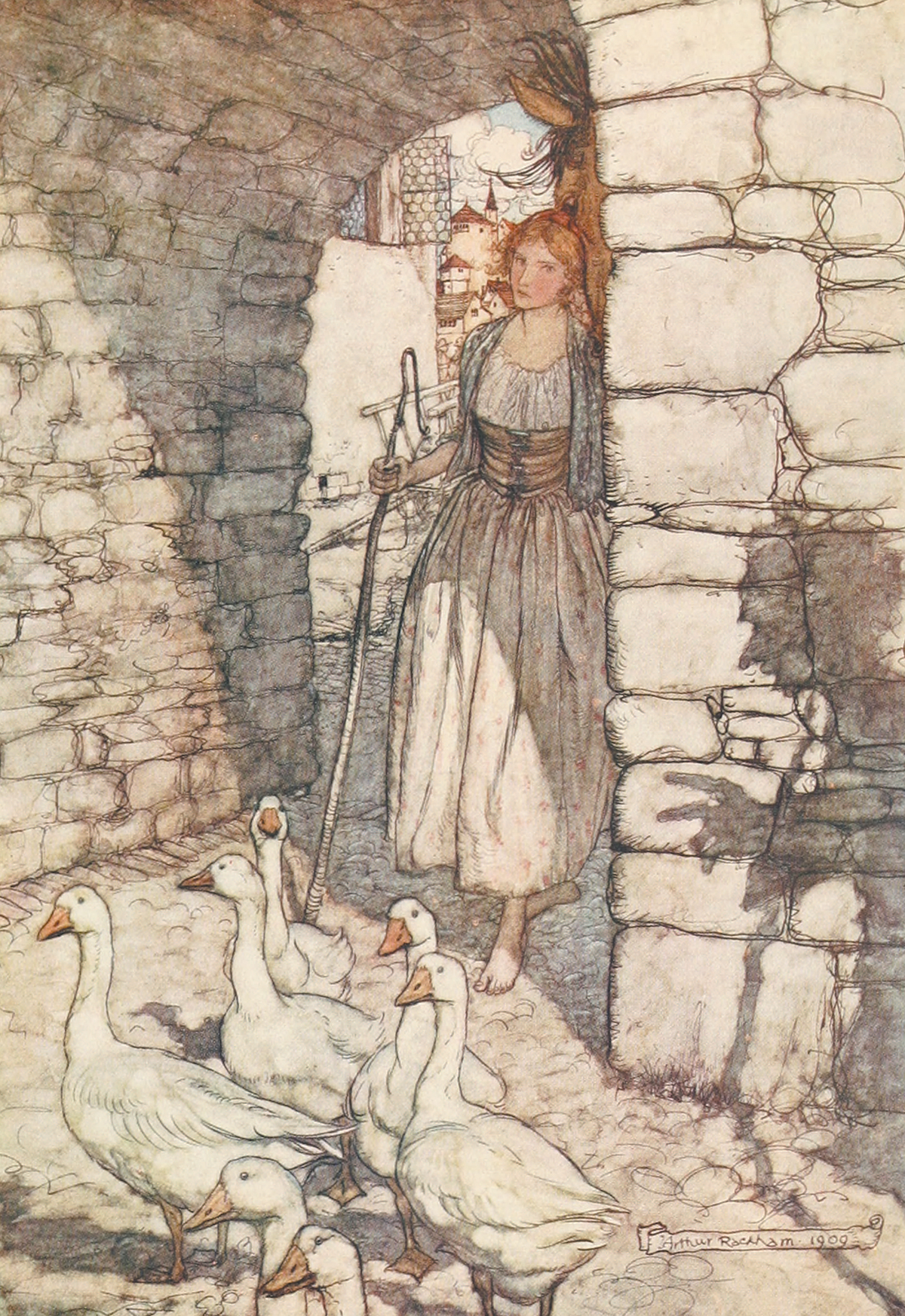
The Goose Girl Illustration by Arthur Rackham
Then he followed them also into the fields, and hid himself in a thicket by the meadow; and there he saw with his own eyes the Goose Girl and boy drive in their geese; and after awhile, she sat down, and, unloosening her hair, which shone like gold, began to sing the old rhyme,—
Blow, blow, thou wind,
Blow Conrad’s hat away;
Its rolling do not stay
Till I have combed my hair,
And tied it up behind.
Then the King felt a breeze come, which took off Conrad’s hat, so that he had to run a long way after it; while the Goose Girl combed out her hair, and put it back in proper trim, before his return. All this the King observed, and then went home unremarked; and when the Goose Girl returned at evening, he called her aside, and asked her what it all meant. “That I dare not tell you, nor any other man,” replied she; “for I have sworn by the free sky not to speak of my griefs, else had I lost my life.”
The King pressed her to say what it was, and left her no peace about it; but still she refused. So at last he said, “If you will not tell me, tell your griefs to this fireplace”; and he went away. Then she crept into the fireplace, and began to weep and groan; and soon she relieved her heart by telling her tale. “Here sit I,” she said, “forsaken by all the world, and yet I am a King’s daughter; and a false servant has exercised some charm over me, whereby I was compelled to lay aside my royal clothes; and she has also taken my place at the bridegroom’s side, and I am forced to perform the common duties of a Goose Girl. Oh, if my mother knew this, her heart would break with grief!”
The old King, meanwhile, stood outside by the chimney and listened to what she said; and when she had finished, he came in, and called her away from the fireplace. Then her royal clothes were put on, and it was a wonder to see how beautiful she was; and the old King, calling his son, showed him that it was a false bride whom he had taken, who was only a servant girl; but the true bride stood there as a Goose Girl. The young King was glad indeed at heart when he saw her beauty and virtue; and a great feast was announced, to which all people and good friends were invited. On a raised platform sat the bridegroom, with the Princess on one side, and the servant-girl on the other. But the latter was dazzled, and recognized her mistress no longer in her shining dress. When they had finished their feasting, and were beginning to be gay, the old King set a riddle to the servant-girl: What such an one were worthy of, who had, in such and such a manner, deceived her masters; and he related all that had happened to the true bride. The servant-girl replied, “Such an one deserves nothing better than to be put into a cask, stuck all round with sharp nails, and then by two horses to be dragged through street after street till the wretch be killed.”
“Thou art the woman, then!” exclaimed the King; “thou hast proclaimed thine own punishment, and it shall be strictly fulfilled.”
The sentence was immediately carried into effect, and afterwards the young King married his rightful bride, and together they ruled their kingdom long in peace and happiness.
This story was taken from the book:
Grimm’s Fairy Tales – With Pictures – By Hope Dunlap
Shop the Tale
Discover this original tale, among many other macabre versions of your most beloved classics, in our collection of disturbingly dark fairy tales.
Other books you might like:
More from the Pook Press Blog:

